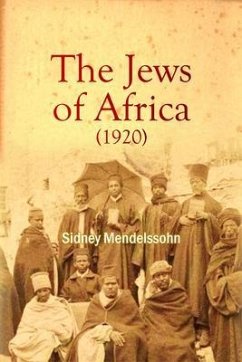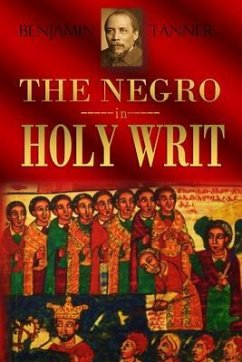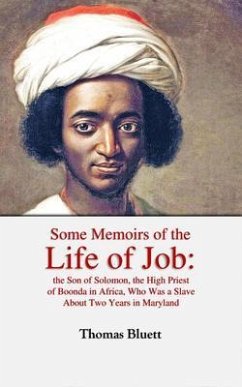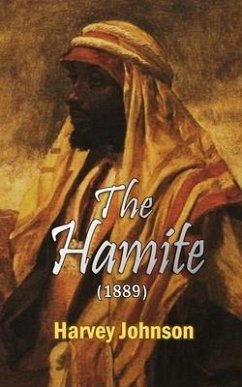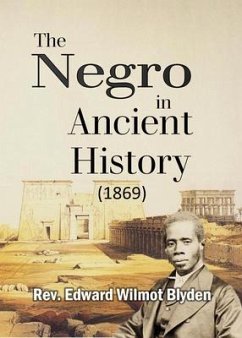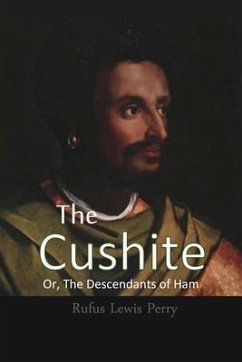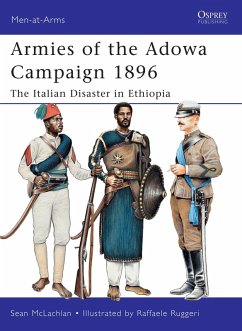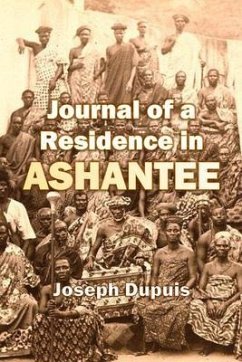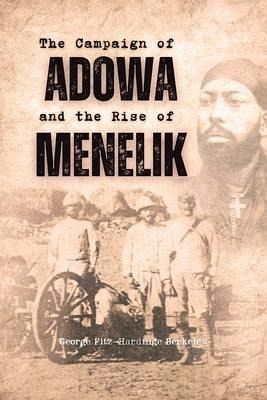
The Campaign of Adowa and the Rise of Menelik (eBook, ePUB)
Versandkostenfrei!
Sofort per Download lieferbar
3,99 €
inkl. MwSt.
Weitere Ausgaben:

PAYBACK Punkte
2 °P sammeln!
"The work of F. H. Berkeley...the best that one can desire as a descriptive narrative of a battle which, from the military point of view, represents the peculiar phenomenon of a European army annihilated by a native African race, and from the political point of view it shows to what a dangerous path a nation can be led by unrestricted colonial ambition." -The Westminster Review (1904)"This is the one thorough account in English of the military operations which culminated in the tragedy of Adowa." -The Guardian, Oct. 17, 1935"The causes and aims of Bahta's revolt were glossed over by Italian co...
"The work of F. H. Berkeley...the best that one can desire as a descriptive narrative of a battle which, from the military point of view, represents the peculiar phenomenon of a European army annihilated by a native African race, and from the political point of view it shows to what a dangerous path a nation can be led by unrestricted colonial ambition." -The Westminster Review (1904)
"This is the one thorough account in English of the military operations which culminated in the tragedy of Adowa." -The Guardian, Oct. 17, 1935
"The causes and aims of Bahta's revolt were glossed over by Italian commentaries...British military historian G.F.H. Berkeley's account at the turn of the century is still the standard one in English." -Between the Jaws of Hyenas: A Diplomatic History of Ethiopia (2011)
"It is a military history of the Italian-Abyssinian and Italian-Dervish campaign which culminated in the victory of the Ethiopians at Adowa." Victoria Daily Times, Sept. 21, 1936
How did the Christian Ethiopian King Menelek unite his country and soundly defeat its would-be colonial master, Italy, and Italy's allied Islamic forces at the decisive battle of Adwa in 1896?
In 1902, British military historian George Fitz-Hardinge Berkeley (1870 -1955) would publish the first English book on the battle of Adwa in his book titled "The Campaign of Adowa and the Rise of Menelik." It is this book that has been republished here for the convenience of the interested reader.
The battle of Adowa is so interesting a subject, from the political and military point of view alike, that one is tempted to wonder how it was that English literature had to wait well-nigh seven years before a book was written upon the same in the English language by an English author. The work of F. H. Berkeley which we are now considering, was not only the first, but the best that one can desire as a descriptive narrative of a battle which, from the military point of view, represents the peculiar phenomenon of a European army annihilated by a native African country, and from the political point of view it shows to what a dangerous path a nation can be led by unrestricted colonial ambition. Italy suffered there a great disaster, but she was not slow in learning the dire lesson thereof.
This book opens with a very lucid and interesting description of the events which preceded the fatal campaign of 1895-1896. Of course the description of the battle of Adowa occupies the greater part of the book, and therein Mr. Berkeley shows to the best advantage his military knowledge and his great and sincere sympathy with Italy. He has been exceedingly generous both in excusing Lord Salisbury's indifference to Italy's trouble and difficulties, and in the very mild way he has judged Baratieri's unpardonable blunders and phenomenal incompetence in grasping the magnitude of the task he undertook.
The warriors who fought at Adowa won a fresh lease of independence for their country. The author has gathered all information concerning the details from eye-witnesses, and his narrative, besides being most vivid and impressive, may be reckoned to be equally authoritative. In conclusion, this is a book full of "object-lessons." Therein one may learn how things can be mismanaged; how battles, bravely fought, may be lost through blunders at the headquarters; how a heroic army can fight a lost battle to the bitter end, and this is more important as an object-lesson how small details, the mistake of a name, a message not properly worded, a moment of perplexity, and so on, work havoc on the battlefield, and cause disaster.
"This is the one thorough account in English of the military operations which culminated in the tragedy of Adowa." -The Guardian, Oct. 17, 1935
"The causes and aims of Bahta's revolt were glossed over by Italian commentaries...British military historian G.F.H. Berkeley's account at the turn of the century is still the standard one in English." -Between the Jaws of Hyenas: A Diplomatic History of Ethiopia (2011)
"It is a military history of the Italian-Abyssinian and Italian-Dervish campaign which culminated in the victory of the Ethiopians at Adowa." Victoria Daily Times, Sept. 21, 1936
How did the Christian Ethiopian King Menelek unite his country and soundly defeat its would-be colonial master, Italy, and Italy's allied Islamic forces at the decisive battle of Adwa in 1896?
In 1902, British military historian George Fitz-Hardinge Berkeley (1870 -1955) would publish the first English book on the battle of Adwa in his book titled "The Campaign of Adowa and the Rise of Menelik." It is this book that has been republished here for the convenience of the interested reader.
The battle of Adowa is so interesting a subject, from the political and military point of view alike, that one is tempted to wonder how it was that English literature had to wait well-nigh seven years before a book was written upon the same in the English language by an English author. The work of F. H. Berkeley which we are now considering, was not only the first, but the best that one can desire as a descriptive narrative of a battle which, from the military point of view, represents the peculiar phenomenon of a European army annihilated by a native African country, and from the political point of view it shows to what a dangerous path a nation can be led by unrestricted colonial ambition. Italy suffered there a great disaster, but she was not slow in learning the dire lesson thereof.
This book opens with a very lucid and interesting description of the events which preceded the fatal campaign of 1895-1896. Of course the description of the battle of Adowa occupies the greater part of the book, and therein Mr. Berkeley shows to the best advantage his military knowledge and his great and sincere sympathy with Italy. He has been exceedingly generous both in excusing Lord Salisbury's indifference to Italy's trouble and difficulties, and in the very mild way he has judged Baratieri's unpardonable blunders and phenomenal incompetence in grasping the magnitude of the task he undertook.
The warriors who fought at Adowa won a fresh lease of independence for their country. The author has gathered all information concerning the details from eye-witnesses, and his narrative, besides being most vivid and impressive, may be reckoned to be equally authoritative. In conclusion, this is a book full of "object-lessons." Therein one may learn how things can be mismanaged; how battles, bravely fought, may be lost through blunders at the headquarters; how a heroic army can fight a lost battle to the bitter end, and this is more important as an object-lesson how small details, the mistake of a name, a message not properly worded, a moment of perplexity, and so on, work havoc on the battlefield, and cause disaster.
Dieser Download kann aus rechtlichen Gründen nur mit Rechnungsadresse in A, D ausgeliefert werden.





